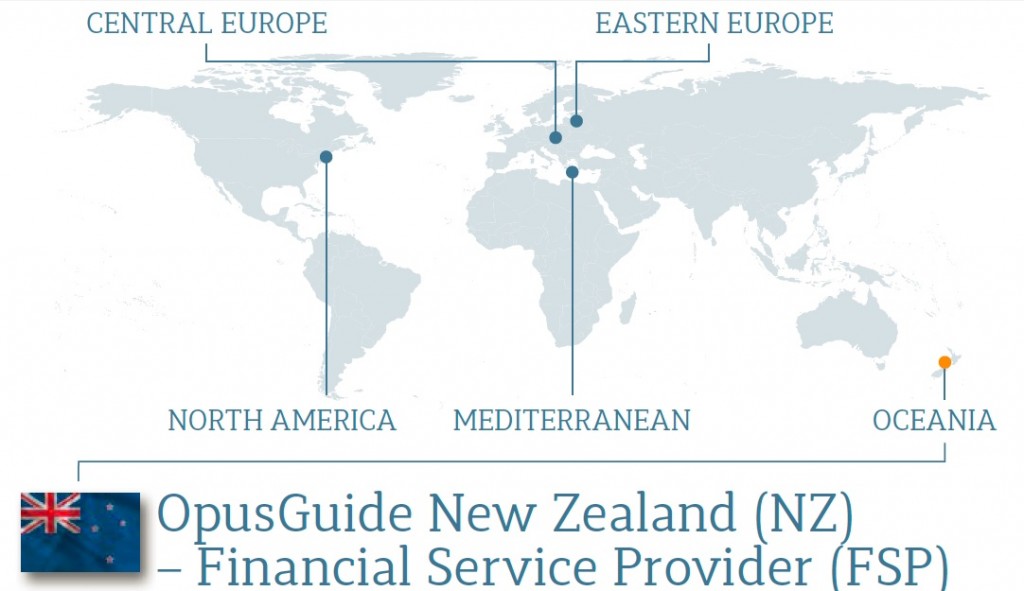 OpusGuide: New Zealand – Financial Service Provider
OpusGuide: New Zealand – Financial Service Provider
New Zealand is a member of the Organization for Economic Co-operation and Development (OECD) and it ranks fifth on the world’s most developed countries list. Its stable economy is based on the financial sector and the high level of business transparency is one of its biggest assets. New Zealand’s steady tax jurisdiction is additionally reinforced by governmental activities which aim to implement a tax system that will
stimulate the country’s development.
| REGIME | There is a special regime named Financial Service Provider, which is stipulated for residents of New Zealand, including individuals and entities (the person). The FSP stands for the person acting as a financial institution in the territory of NZ within the scope of activities as defined below. Some of the information below is provided under an assumption that the FSP acts as a company registered in NZ. |
| REGISTRATION DUTY | Generally, persons who are carrying on a business of providing or offering to provide financial services in NZ are required to register in the Financial Service Providers Register (FSPR). The Register is maintained by the New Zealand Companies Office. |
| SPHERE OF ACTIVITIES | The FSP covers financial activities and can legally offer services such as: – deposit taking; – keeping, investing and managing money, securities and investment portfolios on behalf of third parties; – providing credit under a credit contract; – operating a money or value transfer service; – issuing and managing means of payment; – giving financial guarantees; – changing foreign currency; – entering into or trading on an exchange, in an over-the-counter market or otherwise, the following on behalf of another person; – money market instruments (including cheques, bills, certificates of deposits); – foreign exchange (including forward foreign exchange contracts); – derivative products including, but not limited to, futures and options; – exchange rate and interest rate instruments, including products such as swaps and forward rule agreements. |
| GOVERNING BODIES AND OTHER IMPORTANT POSITIONS /FUNCTIONS | Shareholders/owners | At least one shareholder/owner is required. This sole shareholder/owner can be a resident of any country and can be for example a natural person, a company or a trust. |
| Management | The minimum number of directors required is one. On the board of directors, one director must be a local resident and all others can be foreigners. However, if there is only one director, s/he must be resident in NZ and a natural person. | |
| Supervisory board | There is no obligation to appoint a supervisory board. | |
| USE OF TRUSTEESHIP | Nominee partner | The actual owners of the FSP (the so-called ultimate beneficial owner ) may act through a nominee partner within the institution of a trust deed. |
| HEADQUARTERS | The FSP needs to have a seat and the place of effective business in the territory of the New Zealand and full details of the office/address declared upon registration. | |
| TIMESCALES | Dissolution | Procedure for carrying out a dissolution is available. The FSP can be dissolved by any shareholder/owner giving notice to New Zealand Companies Office of his/her intention to dissolve the FSP. |
| Strike-off | Not applicable | |
| BANK ACCOUNT | Required | |
| NATIONAL CURRENCY | New Zealand’s Dollar | |
| OFFICIAL LANGUAGE | English | |
| FISCAL YEAR | Generally, a fiscal year must be marked as twelve consecutive months. | |
| TAX RESIDENCY | in New Zealand | |
| INCOME TAX (CIT) | 28% tax rate applies to the worldwide income. | |
| SPECIAL TAX REGIME | NZ approves issuer levy regime (2% tax) on interest only. It is applicable when interest has a New Zealand source and that interest is derived by a non-resident person. Normally, the interest is derived from a New Zealand tax resident. | |
| WITHHOLDING TAX (WHT) | There is no WHT. | |
| ANTI-TAX – AVOIDANCE RULES |
Transfer pricing: YES
CFC: YES
|
|
